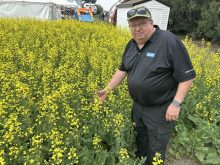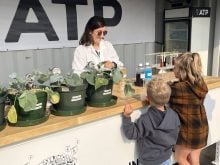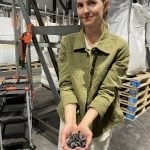Rex Newkirk won’t need roadside pit stops to fill up his truck with biodiesel this fall. The Canadian International Grains Institute researcher will be towing his own portable refinery behind him.
Newkirk is using a $45,000 grant from the Manitoba Rural Adaptation Council and $15,000 of institute money to build a skid-mounted, miniature biodiesel plant. He plans to haul it around Manitoba, Saskatchewan and Alberta this fall and winter, showing groups of farmers how to turn canola seed into fuel.
“We’ll do our best to replicate larger scale systems,” said CIGI’s biodiesel project leader.
Read Also

First annual Ag in Motion Junior Cattle Show kicks off with a bang
Ag in Motion 2025 had its first annual junior cattle show on July 15. The show hosted more than 20…
Plans for the travelling training seminar are still in their infancy but Newkirk envisions a three-day course that will be offered at five different locations in each of the three prairie provinces.
“We anticipate it will be a fairly low cost, probably in the range of $400 per producer. But it is still to be determined.”
The institute will be contacting agencies like the Canadian Agricultural Skills Service to see if they can help producers pay for the course.
Newkirk said the short course will provide a comprehensive overview of biodiesel manufacturing, touching on subjects ranging from safety procedures for handling toxic substances like methanol to how to meet internationally accepted biodiesel standards.
An integral part will be a hands-on demonstration of how a plant converts canola seed into a usable fuel.
The institute felt such a course was necessary because there are many groups of farmers either building plants or considering setting one up in their community.
“High fossil fuel prices and demand for more environmentally sustainable fuel sources has prompted great interest in biodiesel production – both at an industrial scale and at the community, producer level,” said Newkirk.
Farmers are being approached by people trying to get them to invest in biodiesel plants, but they know little about the business.
There are no training facilities in Western Canada that can offer technical support or provide assistance in understanding the markets for biodiesel and its byproducts like canola meal and glycerol.
“Without understanding what’s involved and the economics of the process, I think it’s hard to make an informed decision,” said Newkirk.
Manitoba Rural Adaptation Council director Barry Routeledge said with the desire for community ownership of biodiesel plants, it is important to advance baseline research on the subject.
“This project will help producers learn what mistakes to avoid while moving towards making small-scale biodiesel production more economically viable,” he said.
Once it has completed its prairie-wide tour, the pilot plant will be housed at the Richardson Centre for Functional Foods and Nutraceuticals at the University of Manitoba, where it will be used as a resource for researchers and as a training tool for CIGI’s international customers.

















